Jumat, 31 Desember 2021
Show HN: A tool to help you finish projects, learn skills and develop habits https://ift.tt/3JuK3gi
Show HN: Stream-write-ods – Make OpenDocument Spreadsheets on the fly in Python https://ift.tt/3mHxJPW
Show HN: I made it easy to create personalized pages https://ift.tt/3zlZmTW
Show HN: 8Bit Computers Book https://ift.tt/3EFLNj5
Show HN: Pystitcher – A Declarative Alternative to Pdftk https://ift.tt/34baebJ
Show HN: HackerScroll, A simple and clean inline Hacker News submissions reader https://ift.tt/3ezRSmL
Kamis, 30 Desember 2021
Show HN: How I completed a project I abandoned 5 years ago https://ift.tt/3qDOrRm
Show HN: I Made Mac App to Hide Sensitive info while screen share https://ift.tt/3qD3ieO
Show HN: Only Recipe – Remove clutter from recipe sites. No life story,no popups https://ift.tt/3z8hwZf
Show HN: GitHub Wrapped https://ift.tt/3JtjFmY
Show HN: JavaScript-like generators on Common Lisp https://ift.tt/3zamCnz
Show HN: I'm writing a free, illustrated textbook for system design interviews https://ift.tt/3mK9e4F
Show HN: JoJoGAN, face to JoJo, Disney and Arcane style https://ift.tt/3FGtknY
Show HN: Whirrel – The Predictive Crypto Price Index https://ift.tt/3FGUKtI
Show HN: Sish – Tunnels to localhost using SSH https://ift.tt/32sNweM
Muni Highlights in 2021: More Service to More Destinations
By Jonathan Streeter
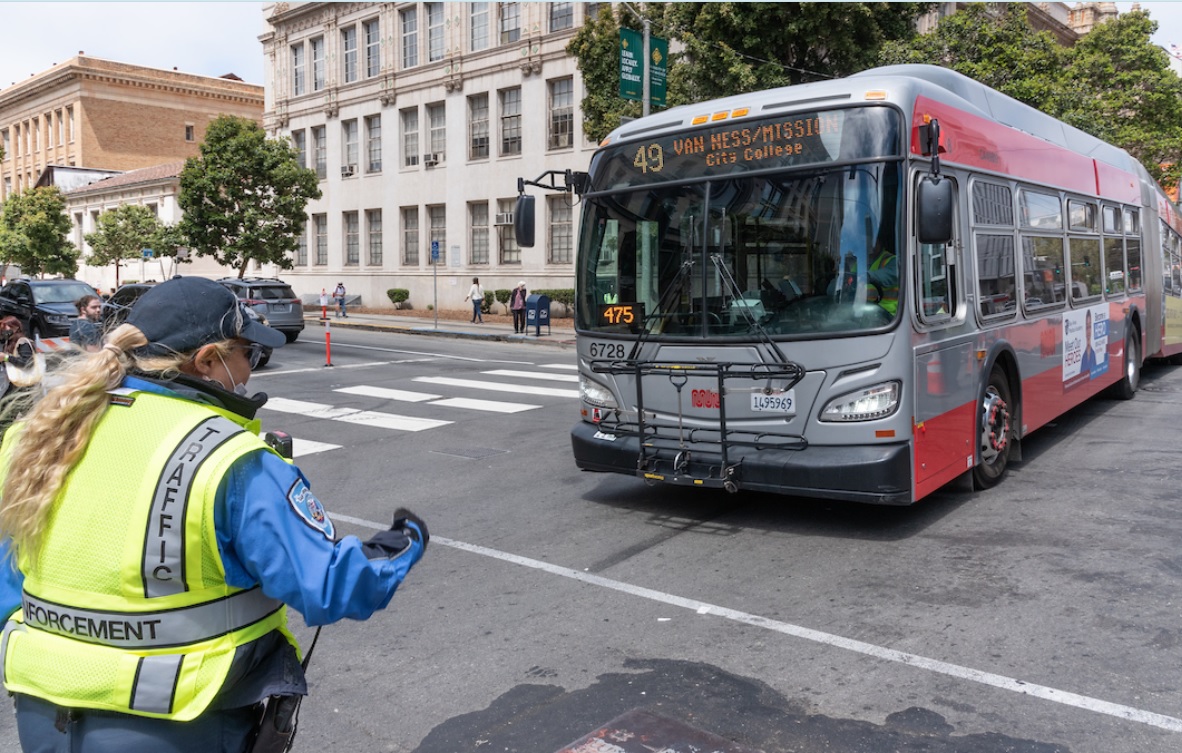
Our goal for Muni in 2021 was to match the service we offer with the changing travel patterns of an unpredictable era, as San Franciscans grappled with a second year of the COVID-19 pandemic. To achieve this, we expanded on the core routes that formed the nucleus of our early 2020 pandemic network by adding and improving service in key areas throughout San Francisco. We focused on access in neighborhoods where essential workers live, as well as on adding service in busy corridors and even creating new lines.
At the beginning of the year, even with our reduced schedule, 91% of San Franciscans were within two or three blocks of a Muni stop. This included 100% of residents in San Francisco’s neighborhoods identified by the Muni Service Equity Strategy. By summer 2021, we added enough additional service so that 98% of San Franciscans were within two or three blocks of a Muni stop.
To the relief of many, and as an early sign of the city’s return to some sense of normalcy, we brought back Muni Metro service in the subway in May 2021, with access to all stations from Embarcadero through to West Portal. The SFMTA worked to address longstanding subway congestion issues that were a major cause of delay pre-pandemic by exclusively running two-car trains in the subway, including a combined KT Ingleside Third, and as-needed shuttle service. In doing so, we were able to increase capacity and improve on-time performance over the course of the year. The J Church is scheduled to return to the subway in February 2022 while efforts to address longtime subway service challenges continue.
To help support the economic recovery of the city, local tourism and small businesses we also brought cable cars back to the hills of San Francisco in September 2021 after extensive maintenance and testing. These iconic cars not only serve as a symbol of our city, they also provide an important link on steep streets between downtown and Fisherman's Wharf, as well as to Cathedral Hill.
On the street, San Francisco traffic returned to near pre-pandemic levels. To keep transit service fast and reliable for essential workers and those with the fewest transportation choices, we implemented temporary emergency transit lanes (TETLs). These lanes are dedicated to Muni vehicles to help keep our customers moving, as well as helping other buses and, in most cases, taxis.
Of the nearly 10 miles of lanes initially implemented, almost six miles of these transit lanes have been made permanent because of their success in protecting transit travel-time savings. That’s the fastest expansion of transit lanes in the city’s history! These transit lanes give nearly two-thirds of Muni riders priority on congested streets and improve the speed and reliability of bus service; getting you to your destination faster.
A significant aspect of transportation in 2021 was the continued shift by Muni riders toward using buses and trains for essential trips and to stores, appointments, schools and recreational destinations rather than to downtown for office work. We responded to these changes by modifying routes.
For example, we launched the temporarily combined route —the 36/52 Special — which served the hilltop neighborhoods of Forest Hill, Miraloma and Sunnyside in a loop between Forest Hill Muni Station and Glen Park BART Station before service was restored to the 36 Teresita and 52 Excelsior in August. As travel patterns shifted over the year, SFMTA’s transit planners developed creative solutions to meet San Francisco’s evolving transportation needs with available resources.
The SFMTA continued to face resource limitations in 2021 that curtailed our ability to bring service back to our original network. Without enough operators and other key staff, we had to make tough choices about which lines to serve and how much frequency to provide. Muni ridership has also not fully recovered. As of December 2021, ridership throughout the network is still at about only half of pre-pandemic levels.
We asked San Franciscans in fall 2021 what we should prioritize when we’re able to add more Muni service in 2022. Based on feedback from meetings, emails, phone conversations and more than 4,500 survey responses, we developed a plan that focuses on restoring connections and meeting the needs of all San Franciscans, especially people with disabilities and seniors. We also heard a call for increased frequency to reduce crowding and wait times on high ridership Muni lines. That proposal was approved by the SFMTA Board of Directors on December 7, 2021.
Throughout the year, Muni customers have shown that they are increasingly ready to return to riding buses and trains and are eager for our network to serve all their desired destinations in San Francisco. We are grateful for the cooperation of the public with revised schedules, mask mandates and other changes that the pandemic has necessitated. We are also incredibly grateful to the people who drive our vehicles through city streets with professionalism, courtesy and safety every single day.
To read more about how we “met the moment” review our 2021 Annual Report.
Published December 30, 2021 at 05:45AM
https://ift.tt/3qCDUpy
Show HN: Pick a Paw – How well do you know your dog breeds? https://ift.tt/3HgihSA
Rabu, 29 Desember 2021
Show HN: Ansible Doc Generator – Easy documentation for your Ansible roles https://ift.tt/3JBeMIG
Show HN: Hoppscotch (Postman alternative) now support Team Collaboration https://ift.tt/3FJvZgM
Show HN: Status Line – Zork (and more) on the Pico-8 https://ift.tt/3sGxUid
Show HN: ChainlessNFT, a NFT Without Blockchain https://ift.tt/3ExOza1
Show HN: Apf – a small tool that exposes container's ports automatically https://ift.tt/3sLR9XX
Show HN: Play BangBang Against a Neural Network https://ift.tt/3Jn2sLZ
Show HN: ToneBoard – A Chinese keyboard for iOS that helps you remember tones https://ift.tt/3HiTMo1
Selasa, 28 Desember 2021
Show HN: Distributed Tracing Using OpenTelemetry and ClickHouse https://ift.tt/3mAPWys
Show HN: A Hugo shortcode to display code and output in your blog https://ift.tt/3FClqMd
Show HN: A Reassuring Parables Generator (like from that Xkcd comic) https://ift.tt/317cdwy
Show HN: Check weather forecast for largest cities in a map radius https://ift.tt/3szNw7j
Show HN: MetaMove – Batch renaming operations based on file metadata https://ift.tt/3sBW7Gs
Show HN: Drovp – Convenient UI for any drag and drop operations https://ift.tt/3mDIGSB
Show HN: It's possible to do infinite scroll without JavaScript https://ift.tt/3EreUGM
Show HN: NFT Reverse Search Engine https://ift.tt/3erAPD0
Show HN: We built an app for reading articles saved for later https://ift.tt/3eqihTM
Show HN: A sudoku solver in pure Nix https://ift.tt/3z1o8IP
Senin, 27 Desember 2021
Show HN: Server-side SVG price chart library that needs no front end JavaScript https://ift.tt/3JfClGN
Show HN: Wodo.io is a gaming platform with crypto capabilities https://ift.tt/3EsyrXj
Show HN: React hooks library to build powerful components UI framework agnostic https://ift.tt/3puqfBw
Show HN: Nap – A File-Based HTTP Execution Framework https://ift.tt/3qqA82w
Show HN: Toy-lang, Toy programming language created in under 2 weeks https://ift.tt/3Jgnn3n
Show HN: Time tracker for freelancer with shareable URLs https://ift.tt/3sAlbgZ
Minggu, 26 Desember 2021
Show HN: One-Sentence Album Reviews https://ift.tt/32DbyTG
Show HN: I'm building a non-profit search engine https://ift.tt/3z66B23
Show HN: Made a e-4917 emulator with a short tutorial https://ift.tt/3EtZlxS
Show HN: PiTheremin https://ift.tt/30ZqF9R
Show HN: A piano chord-switch practicing tool I made https://ift.tt/3z21lfN
Show HN: Make Holiday AI Art https://ift.tt/3szLELS
Sabtu, 25 Desember 2021
Show HN: A Virtual Xmas Party Experiment https://ift.tt/3FoEaia
Show HN: I hype drivingly recreated my website and it was awesome https://ift.tt/3yWptR9
Show HN: A Reassuring Parables Generator https://ift.tt/3Hb9QrJ
Show HN: A Tiny HTML5 Christmas Puzzle Game in Parenscript https://ift.tt/3yW0mOn
Show HN: Low cost radiation detector using scintillator instead of a Geiger Tube https://ift.tt/3Jk2sfu
Show HN: We built a content discovery and curation tool for Social Media https://ift.tt/3qrX29X
Show HN: Robo Holiday – create holiday themed AI art using natural language https://ift.tt/3ej5Wkp
Jumat, 24 Desember 2021
Show HN: Tact – A simple chat app for iOS, iPadOS and macOS https://ift.tt/3H62iXp
Show HN: Jupyter kernel using Poetry for reproducible Python package management https://ift.tt/30Vm6gB
Show HN: Causelink Root Cause Analysis https://ift.tt/3eltZPA
Show HN: Homechart--free household management app https://ift.tt/32nVdmj
Show HN: HTML/CSS Photo Sheet https://ift.tt/3mqfMoU
Central Subway Revenue Service Update
By Enrique Aguilar
Central Subway Finishes Year on a High Note
As we say goodbye to 2021 and bring in the new year, construction crews for the Central Subway remain laser-focused on the finish line and are working towards completing items in our substantial punch list. It includes testing and certifying elevators and escalators, installing all ticket vending machines and completing small tasks that need to be addressed before the start of service, anticipated for October 2022.
Early next year, construction work will continue on the surface near 4th and King streets to install overhead wire and support systems connecting the Central Subway to the existing Metro system. Train and traffic signaling work and installation of new street lighting between Bryant and Townsend will also resume on 4th Street.
Now that station elevators and escalators are fully functional and tested, equipment must be certified to meet local and federal safety requirements. Fare gates have been installed at all stations and we expect to complete the installation and testing of ticket vending machines In January. With train testing in full gear since August, we anticipate concluding operational testing in the summer of 2022.
Artwork by Yumei Hou is being installed in Chinatown/Rose Pak Station. The artwork consists of two large-scale metal installations based on Yang Ge (Sprout Dance), a folk dance originating in Northeastern provinces in China. Artwork installation in the mezzanine landing is complete and we hope to have artwork in the ticketing hall in full display by the end of the month.
We will continue to bring you updates and share the good news as we prepare for Central Subway’s grand opening and celebrate this historic moment for San Francisco. For project updates, please visit https://www.sfmta.com/projects/central-subway-project.
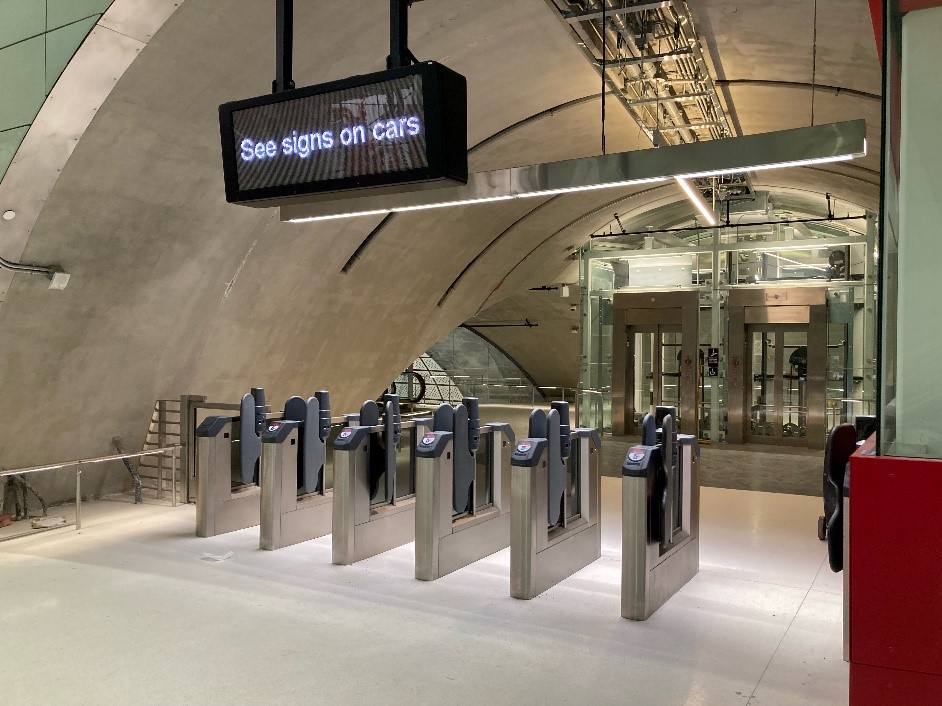
Recently installed fare gates at Chinatown/Rose Pak station
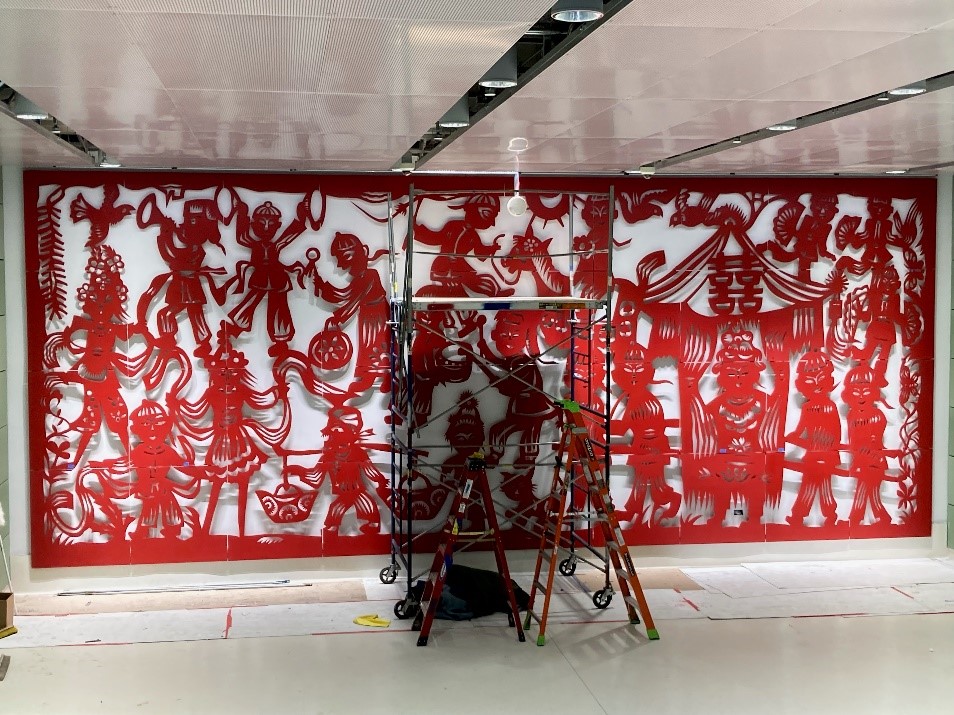
Artwork by Yumei Hou at Chinatown/Rose Pak Station
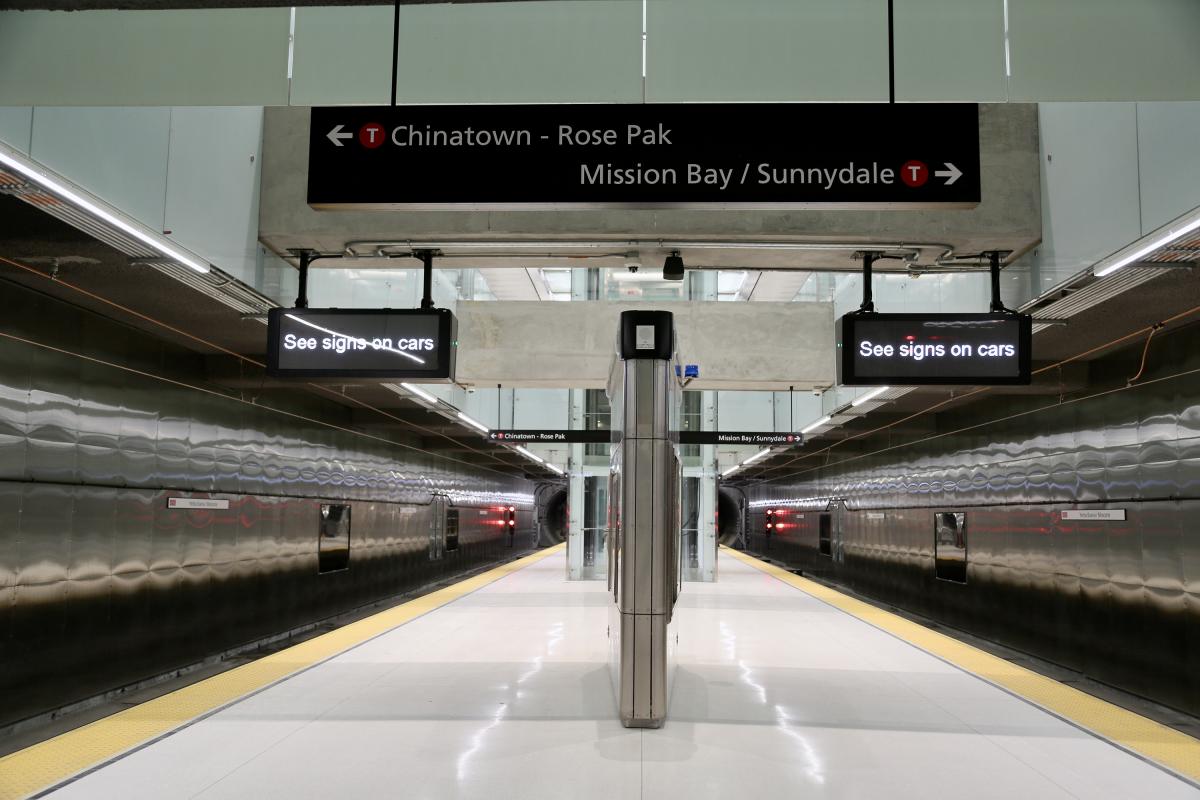
Platform at Yerba Buena Moscone station
Published December 24, 2021 at 01:26AM
https://ift.tt/3qoHNOG
Kamis, 23 Desember 2021
Show HN: Pipe stdin to a ANSI.SYS simulated display https://ift.tt/3qmrhyM
Show HN: Two uBlock Origin rules to improve your Twitch experience https://ift.tt/3pkGtgP
Show HN: Sowhat, open source parser for creating a note-taking system via CLIs https://ift.tt/3qd7nGu
Rabu, 22 Desember 2021
Show HN: Stumbled – A Stumbleupon successor to discover interesting websites https://ift.tt/3ed87pA
Year-End Review of History Uncovered in 2021
By Jeremy Menzies
As the year comes to an end, we are excited to present a selection of historic photos that were preserved in the SFMTA Photo Archive this year. Archive staff have been scanning and cataloguing archival Muni photos that date back 100+ years for over a decade now. Read more about our work in the 10 year milestone blog from 2018.
The images below are a set of richly colored slides, some of which were originally used in presentations by Muni staff in the 1970s. These photos have a wide range of subject matter from everyday street activity to scenic vistas, project documentation and important Muni milestones.
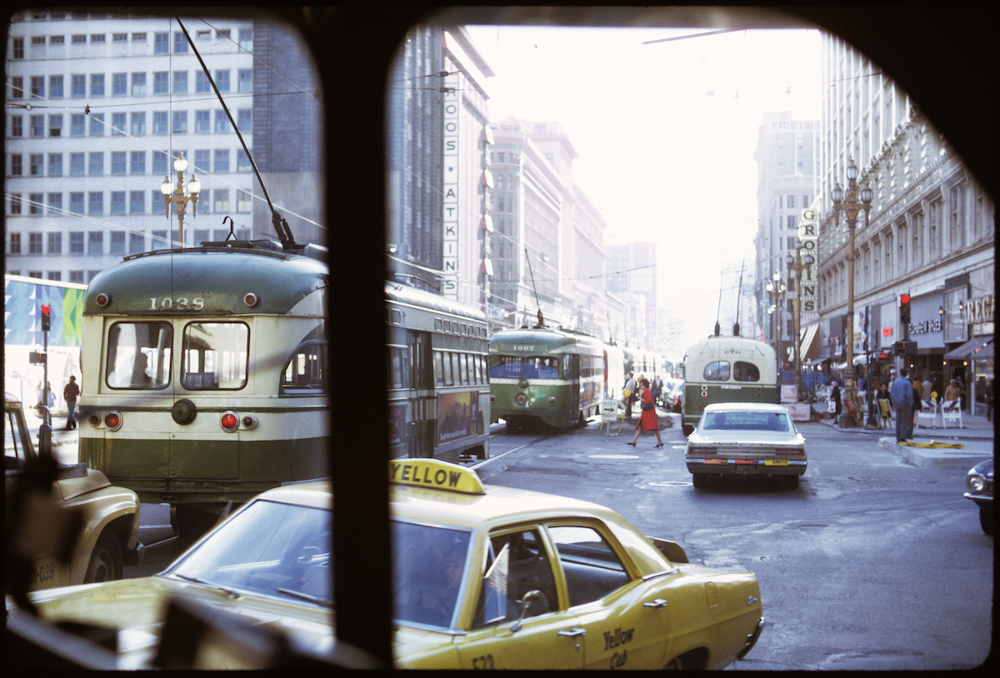
A typical day in the life of a Muni Operator. This shot was taken near Market and 5th Streets in the early 1970s
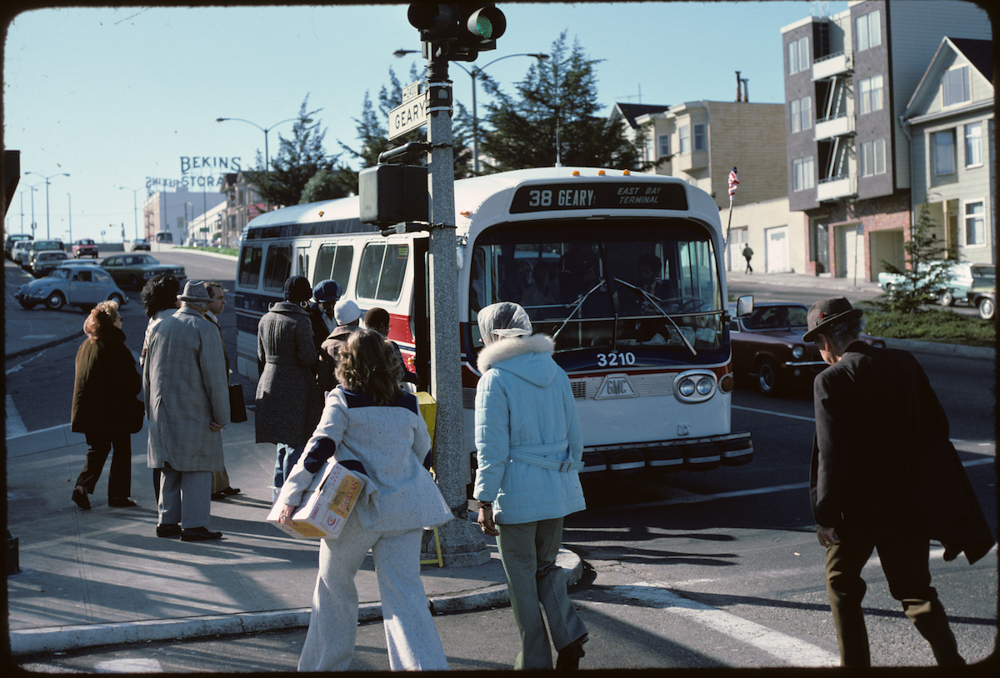
Here, customers board a 38 Geary bus painted for the 1976 Bicentennial in a striking red, white, and blue paint job.
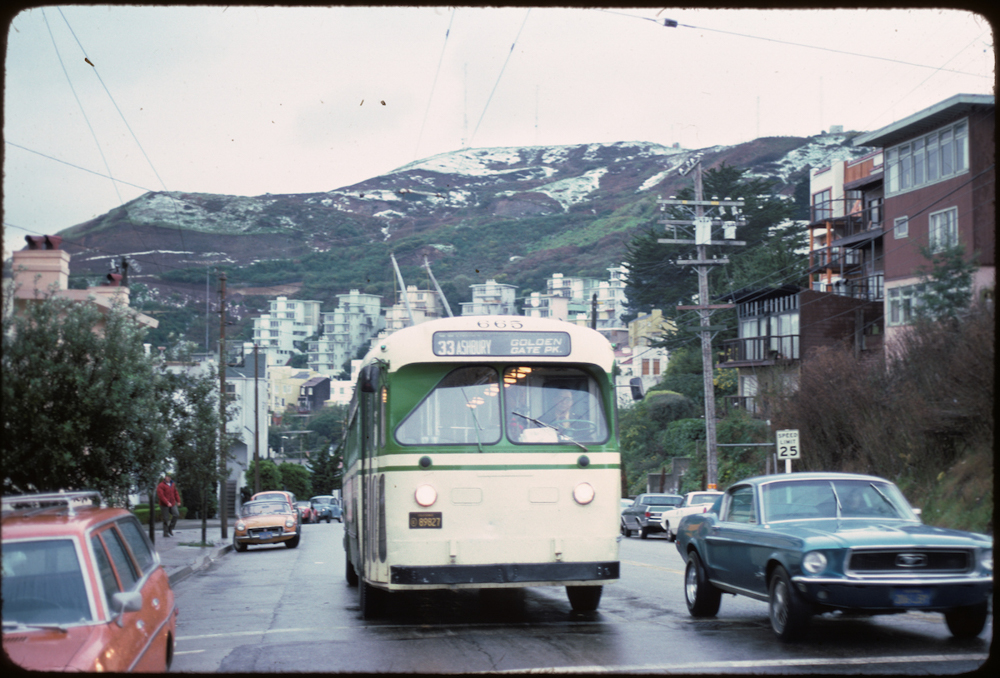
A rare snowfall is captured blanketing parts of Twin Peaks in this February 1976 photo.
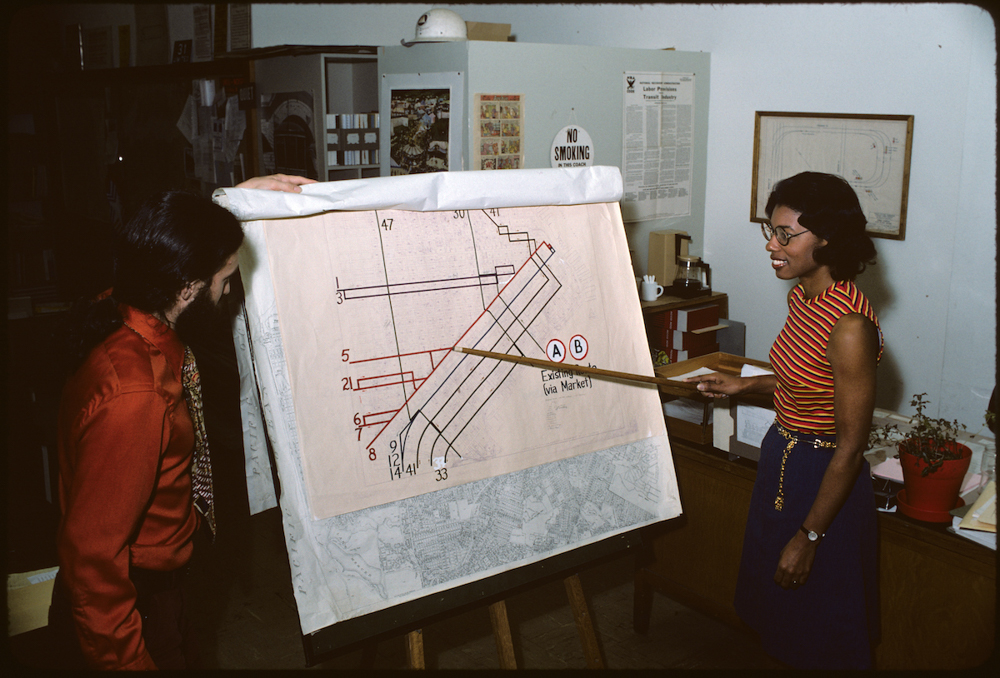
This shot gives a peek inside the operations of Muni, showing Planning Dept. staff reviewing a map of bus lines.
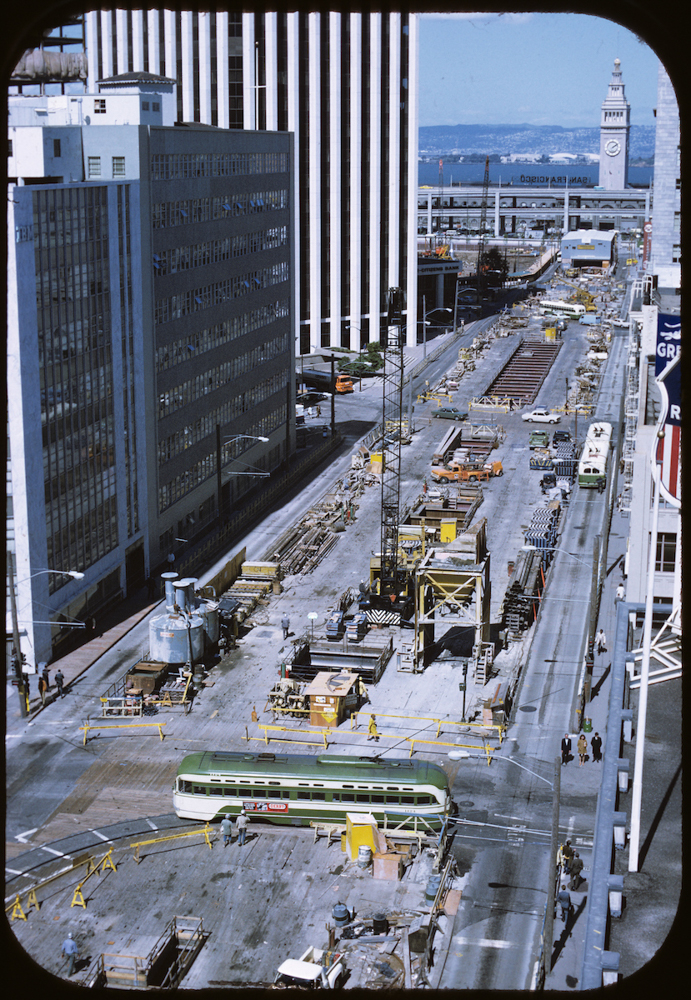
BART and Market Street Subway construction is underway in this early 1970s photo. During construction, Market Street was closed to all vehicles except for transit and local deliveries.
In addition to the color slides, Archive staff performed selective scanning of photos from the 1970s and 80s this year. These photos bring more recent history to view and shed light on life in the city during this time.
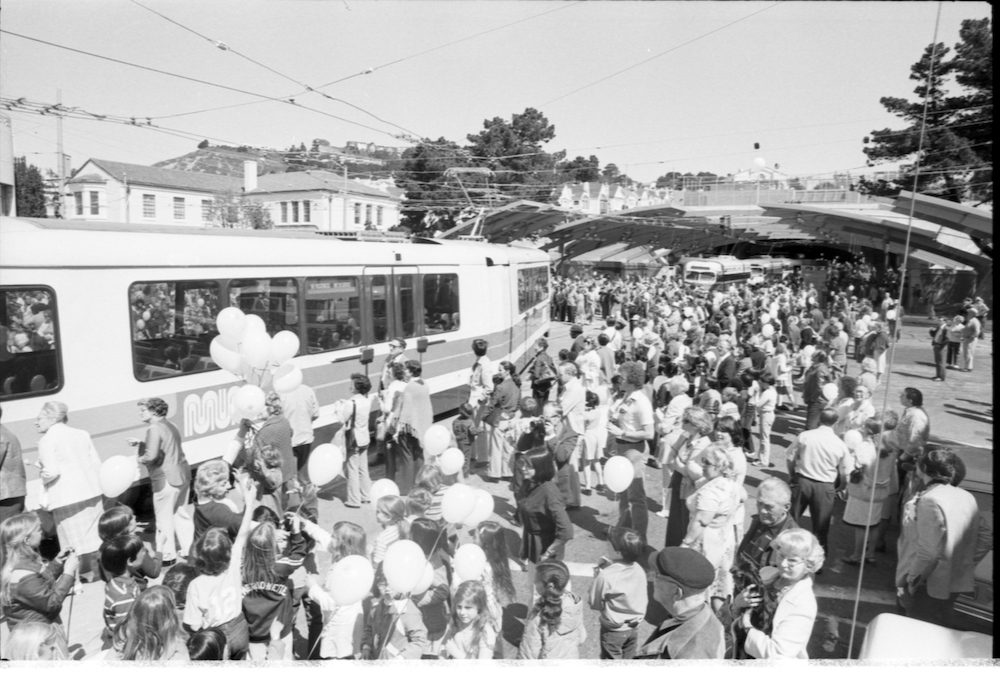
On April 2, 1979, the newly rebuilt West Portal Station opened with a ribbon cutting by the mayor, streetcar parade, and hundreds of citizens touring the station. Just a couple of weeks later, LRV service began on the K Line between Balboa Park and West Portal in advance of the full opening of Muni Metro the following year.
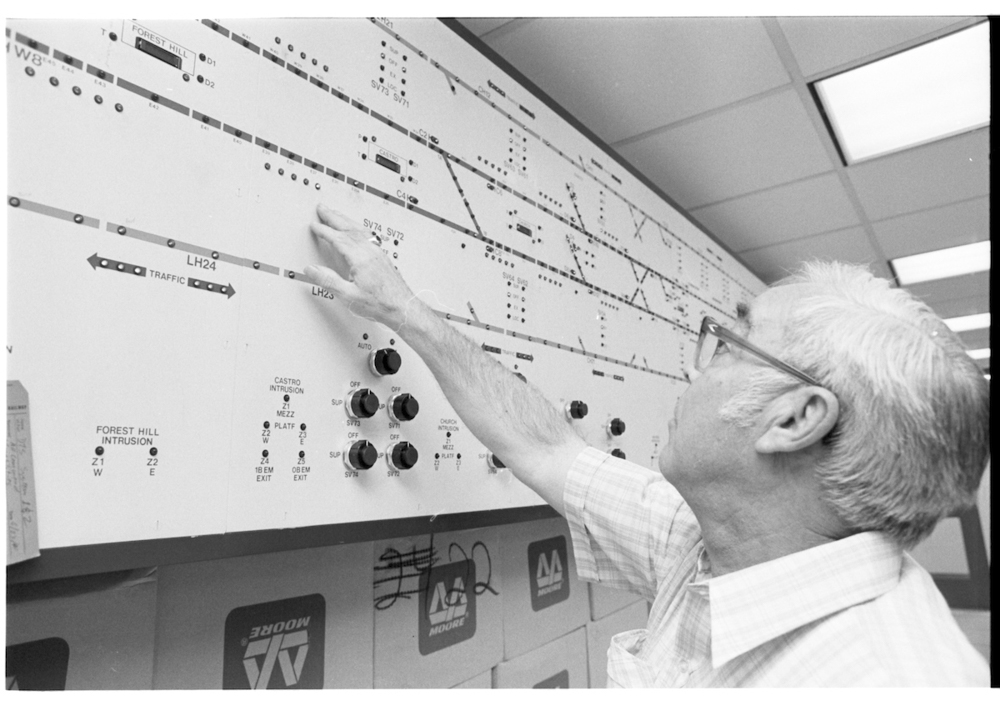
This 1981 shot, taken inside Muni Central Control, shows an electronic board indicating the position of streetcars within the Market Street Subway. At that time, this state-of-the-art tool was critical to monitoring rail traffic in the subway after it opened in 1980.
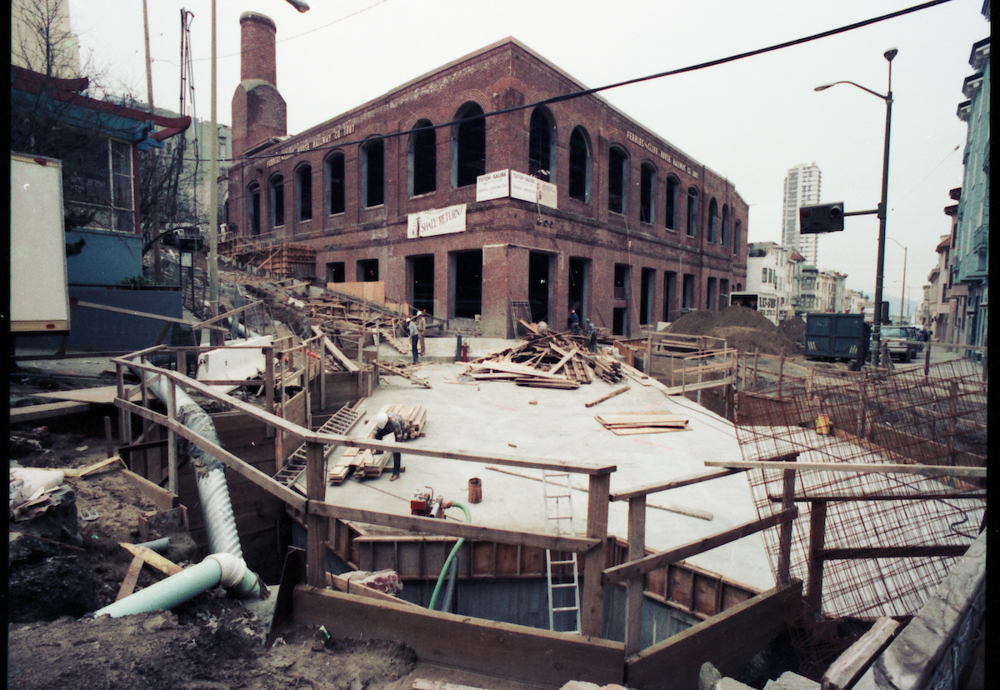
Between 1982 and 84, the Cable Car system was shut down for a complete rebuild. This 1983 photo shows the powerhouse and underground cable infrastructure under construction at Mason and Washington Streets.
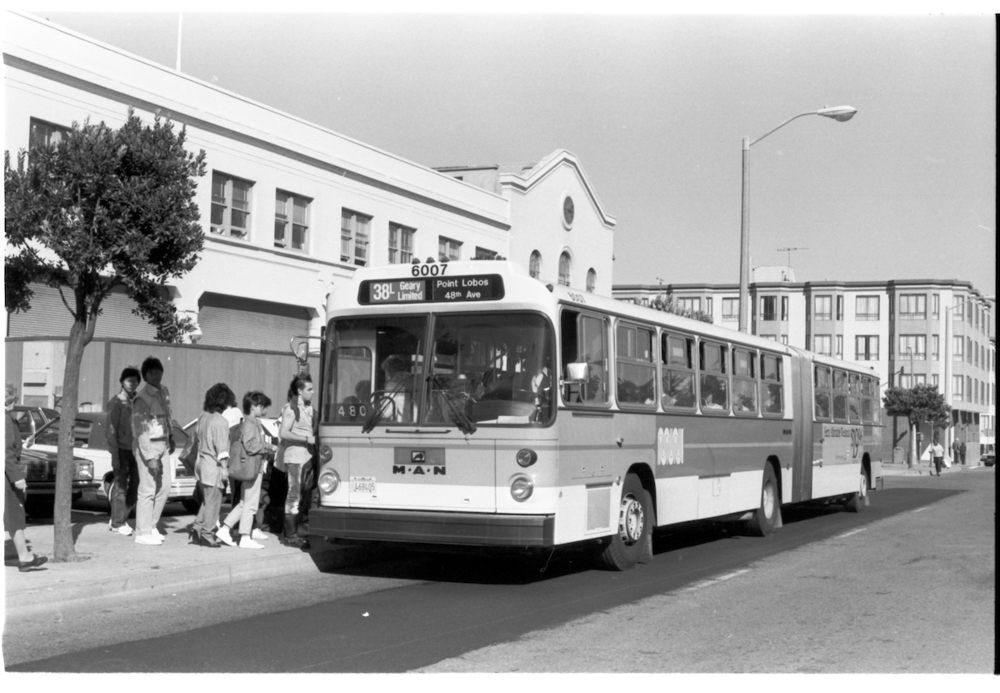
Muni purchased its first extra-long articulated buses in the 1980s to meet demand on high ridership lines like the 38L Geary Limited pictured here at Geary and Presidio in 1985.
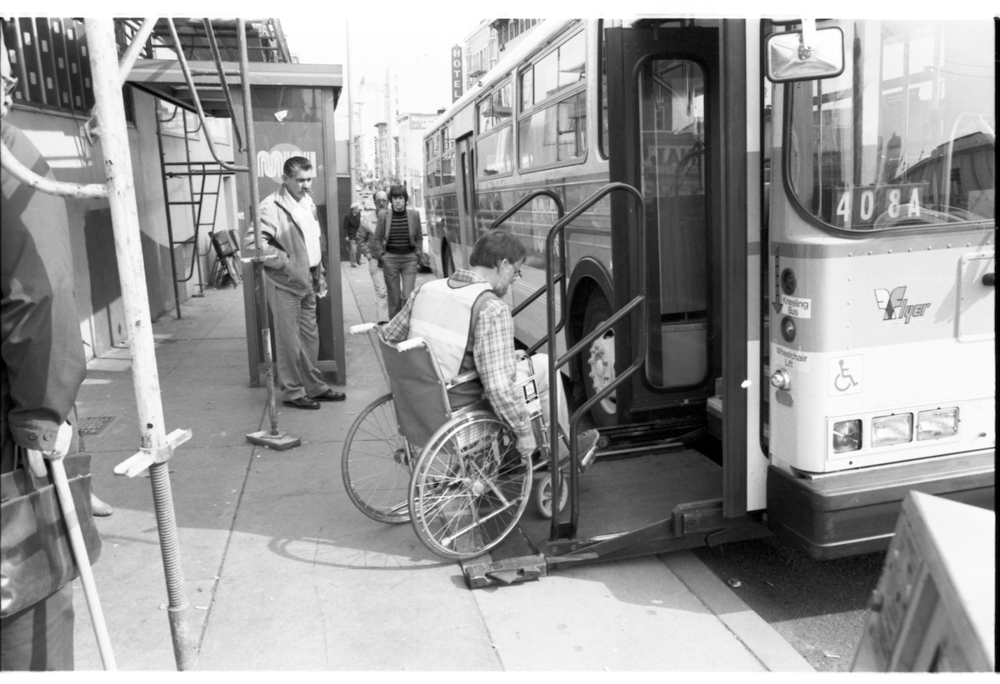
Advocacy groups and federal law brought improvements to the accessibility of the Muni system in the 1980s. With the construction of boarding ramps on rail lines, elevators in subway stations, and the arrival of buses equipped with lifts, more people were able to ride public transit.
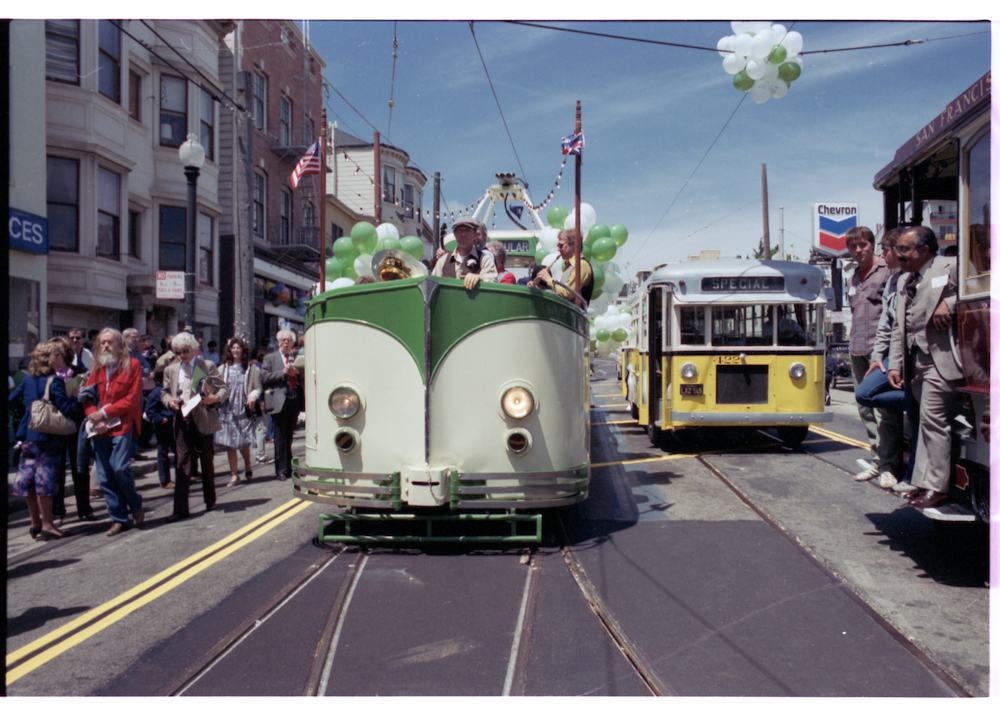
June 23, 1983 marked the first “Trolley Festival”, a celebration of the city’s long and unique transit history carried on today in the Muni Heritage festival. The open-air Boat Car, pictured here, has always been a popular attraction at the festivals.
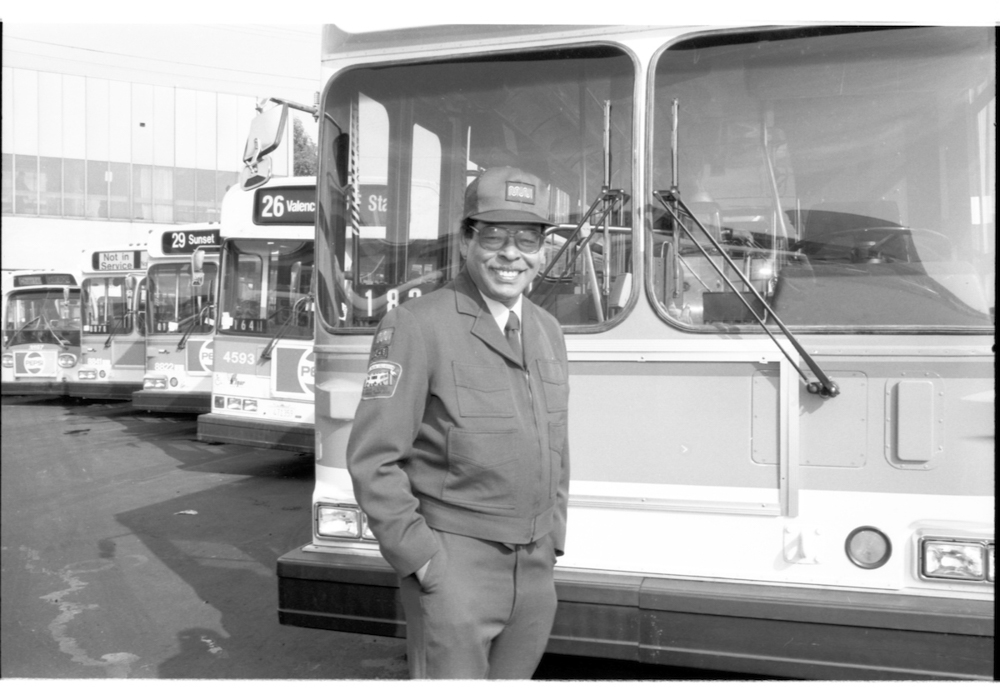
Muni Operator of the Month Marshall Lacewell poses in Woods Division bus yard for this January 1989 shot. Employee award photos are a common subject among the files currently being archived.
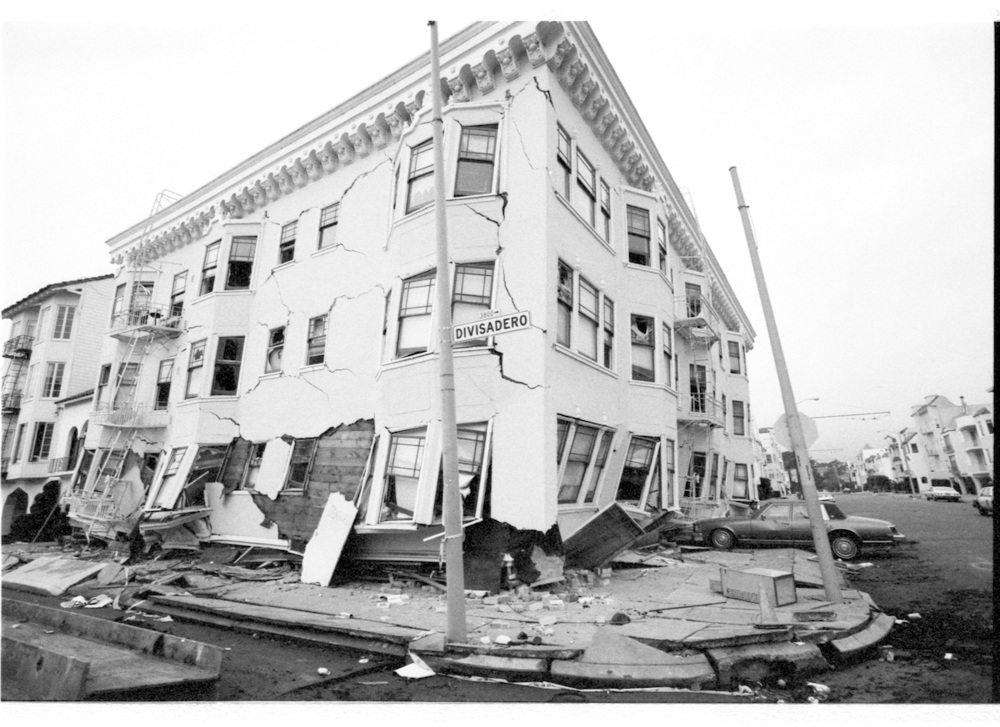
On October 17, 1989, the Loma Prieta earthquake struck with devastating consequences across the region. Muni staff worked through the night to restore transit service and an estimated 65% of vehicles were running by the following morning to provide essential transportation following the disaster.

One quirky “sign of the times” shot scanned this year was this photo of Muni bus painted with Christmas decorations and a fireplace. The bus, an old Marmon Herrington trolley coach, saw limited special service in December ’89.
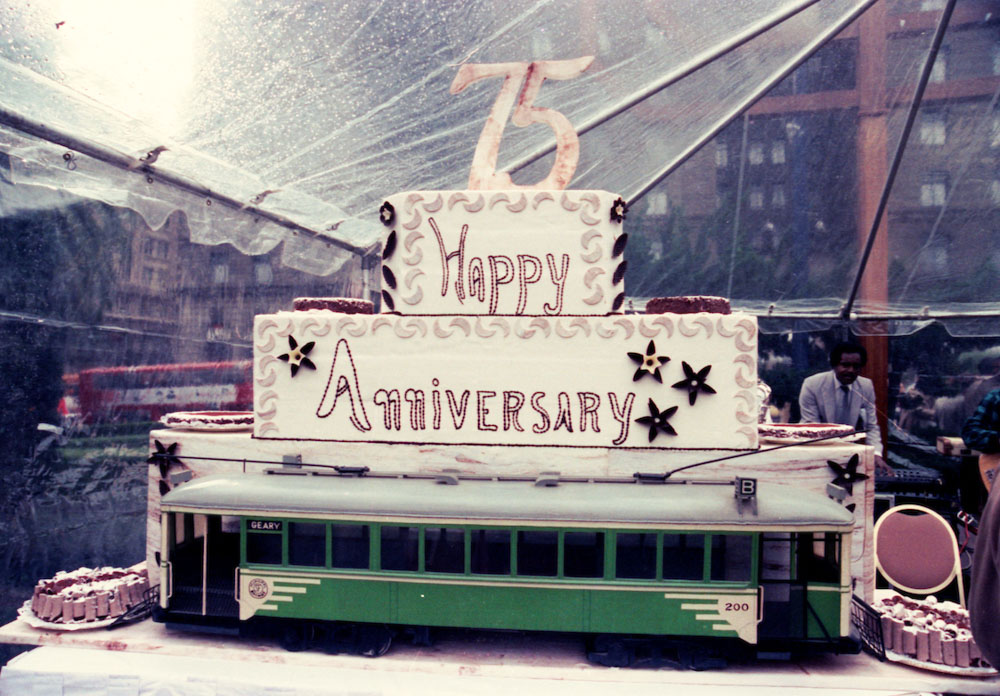
To finish off the list, a shot of a huge cake and streetcar model from Muni's 75th birthday on December 28, 1987. As we look ahead to celebrating our 109th birthday this year, we thank our riders, supporters and leaders for their commitment as we strive to provide the most safe, frequent and reliable service.
Closing out the year with over a decade of new photos from 1978-1990 scanned, staff will continue this work into 2022. We hope you’ve enjoyed this look back in time at some of the latest images to be archived this year. To see more of these and thousands other historic photos dating back to 1903, check out our Photo Archive web page.
Published December 22, 2021 at 10:14PM
https://ift.tt/3yP7BHR
Show HN: Metaheads, a search engine for Facebook comments https://ift.tt/3pk6Ao4
Show HN: Aftertext https://ift.tt/3Enqfrb
Show HN: Greatcountry.org – Ranking all countries in the world https://ift.tt/3mo6uK7
Show HN: UpfrontJS – Data handling framework complementary to active records https://ift.tt/3ebzct1
Selasa, 21 Desember 2021
Show HN: Obstracts – The RSS reader for threat intelligence teams https://ift.tt/3H30Xk1
Show HN: "crzy64", base64 mod aimed for fastest decoding https://ift.tt/3mJx291
Show HN: Glitch Image Generator https://ift.tt/3pg7Yb5
Show HN: Dictations for Teachers Made Easier https://ift.tt/3ei7RFy
Show HN: A Decentralized, End-to-End Encrypted Alternative to Dropbox https://ift.tt/33P8Wmv
Show HN: I made a tool to improve Mission Control on macOS https://ift.tt/3FmUrUP
Show HN: This app will help you build a consistent writing habit https://ift.tt/30PKlgi
Show HN: Embeddable Prolog in Go https://ift.tt/3J65zrq
Show HN: Podcast Search Engine https://ift.tt/3sBJ0oX
Senin, 20 Desember 2021
Livable Streets Look Back 2021
By Eillie Anzilotti
How We Made San Francisco Streets Safer In 2021
As 2021 comes to an end, we're reflecting on everything SFMTA has done to make San Francisco streets safer for all.
But first, let’s wind back 50 years ago to 1971: the year the first bike lanes went in in San Francisco! The city’s first bike lanes on Lake Street came out of a community effort to calm traffic and make the neighborhood safer.
There’s an often-quoted expression that “change happens slowly, then all at once.” For San Francisco safe streets, 2021 is certainly in the “all at once” phase. Fifty years after the first bike lanes were installed in the city, we’re continuing to push the boundaries of what safe streets can look like in San Francisco. Here’s a look at some key progress from this past year:
Transforming the Tenderloin: In a neighborhood where every street is on the city’s Vision Zero High-Injury Network, we implemented a suite of projects to make the whole area safer. Some highlights:
- Two Vision Zero Quick-Build projects: On Golden Gate Avenue, a new protected bike lane was added along with improved curb access for businesses, and Leavenworth was reduced from three travel lanes to two to promote safer speeds.
- Pedestrian scrambles—which stop traffic in all directions to make it safer for everyone to cross—were implemented at 10 intersections
- In a San Francisco first, 20 mph speed limits and No Turn on Red restrictions were implemented neighborhood-wide to improve safety.
- Several COVID-19 response projects have evolved into permanent community features. A physical distancing lane on Jones Street, implemented to give people more space to walk during the pandemic, was turned into a permanent travel lane reduction on the street to calm traffic. A weekly block closure on Turk Street to provide place for gathering and recreating is now Turk Street Safe Passage Park, a full-time street closure that welcomes nearly 100 visitors a day and provides a new public space for the community. These street transformations in the Tenderloin were implemented with collaboration and support from local partners, like Code Tenderloin and the Tenderloin Community Benefit District Safe Passage Program.
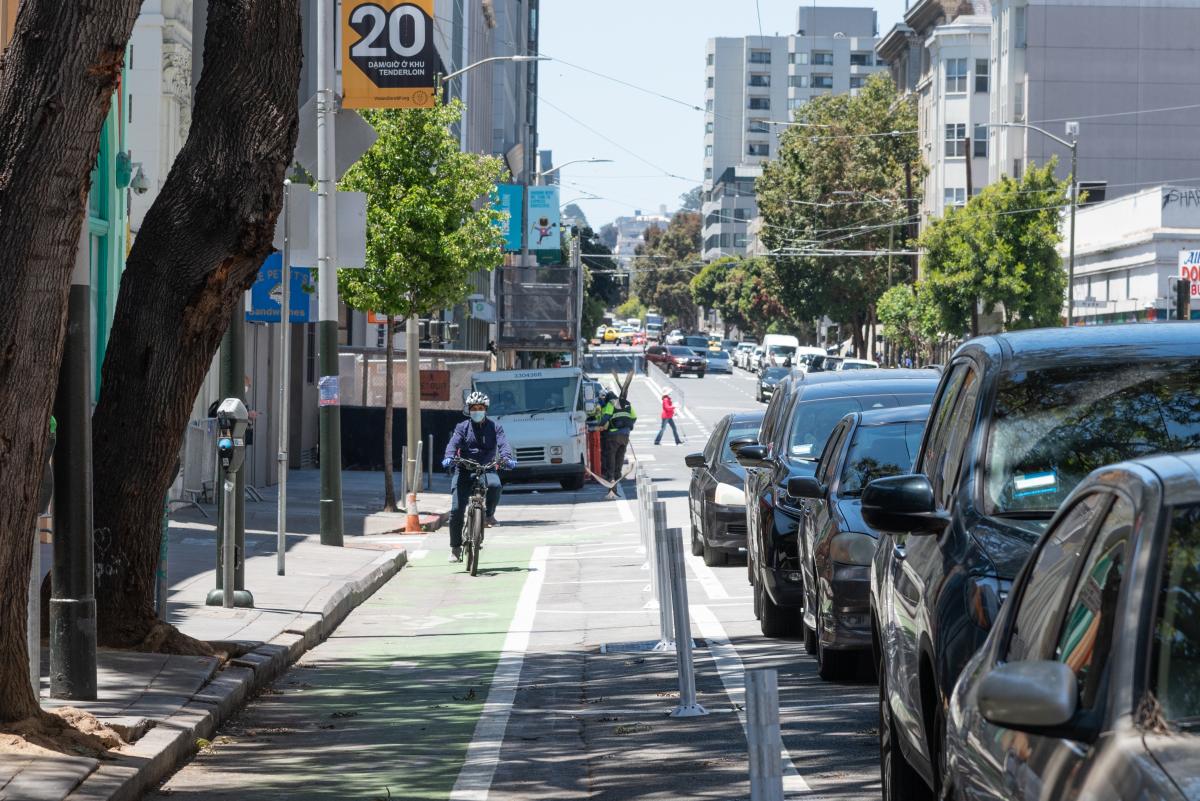
Adding Quick-Builds in the Bayview: After the Bayview Community-Based Transportation Plan was approved by the SMFTA Board in 2020, the first projects were installed this year. Two quick-build projects to improve safety conditions in the Bayview–one on Williams Avenue and one on Evans/Hunters Point/Innes–were completed, along with spot improvements like continental crosswalks. The Quick-Build on Hunters Point Boulevard features concrete barriers painted with murals by local artists.
Expanding San Francisco’s bike network: Over 12 miles of new bike facilities, including 7 miles of new protected bike lanes, were added across the city. Some highlights include a new two-way bikeway on Alemany Boulevard, and a protected bike lane as part of the Folsom Street Quick-Build in SOMA. Nearly five miles of Anza Street have been updated with bikeway markings, speed cushions, and a travel-lane reduction to encourage safer speeds and create an important east-west bike route through the Richmond. You can read more about (and see!) how much San Francisco’s bike network has grown in the last several years in this blog post.
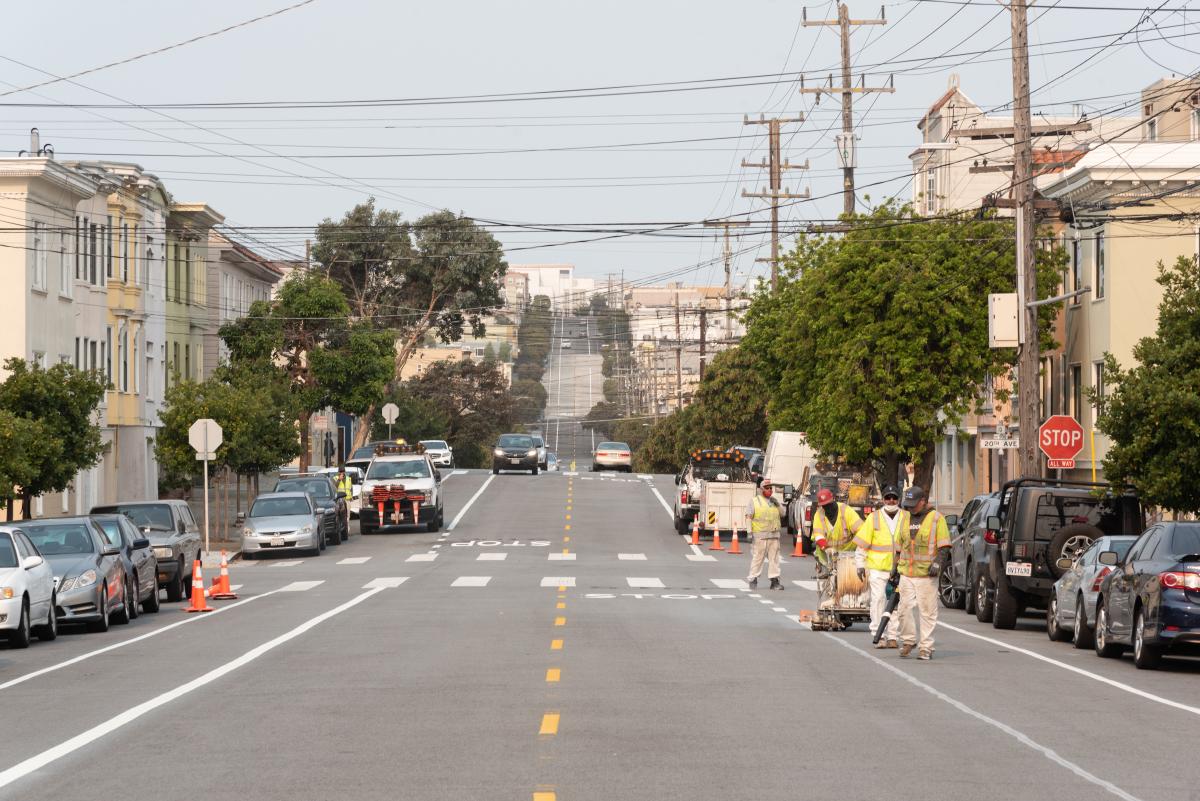
Evolving Slow Streets: Slow Streets have evolved from an emergency response to COVID-19 to one of the SFMTA’s most efficient ways to transform city streets to promote walking, biking, and rolling. In August, the first four post-pandemic Slow Streets–Sanchez, Shotwell, Lake, and Golden Gate–were approved to be extended beyond the pandemic. Sanchez and Shotwell are fully implemented with unique designs informed by extensive community outreach.
Setting records for traffic calming: The traffic-calming program installed over 233 traffic calming devices across the city–the most ever completed in a year. Traffic calming devices like speed humps, speed cushions, and raised crosswalks make any street safer, and the team worked quickly and efficiently to respond to resident requests for safer conditions on their streets.
Thank you to everyone in the community who has advocated for, championed, and made use of these projects across the city. We look forward to continuing to make San Francisco streets safer in 2022!
Published December 20, 2021 at 10:54PM
https://ift.tt/3GZ9NiN
Show HN: Got is like Git, but with an 'o' https://ift.tt/3q9Iz21
Show HN: Alien Battle – defeat your enemies https://ift.tt/3mlBytR
Show HN: Verify NFT and Token Ownership in Your App https://ift.tt/3E9OskN
Show HN: Christmas Backgrounds for Zoom https://ift.tt/3EpVbrb
Show HN: Make My Screen Black https://ift.tt/3skCthX
Show HN: Platform to learn about crypto with visual storytelling https://ift.tt/3mg44NK
Show HN: Extract email attachments into shareable links https://ift.tt/3IXZ5uR
Minggu, 19 Desember 2021
Show HN: Full-featured+fast SIMD CSV lib, extensible utility & web playground https://ift.tt/3mhukr3
Show HN: Generate typed and efficient APIs from a schema file https://ift.tt/3q8bOlY
Show HN: I made a to do list that integrates with Notion https://ift.tt/30GK8vR
Show HN: IR stove thermometer, firmware in Rust https://ift.tt/3e1ZCO2
Show HN: Play BangBang Against a NeuralNetwork https://ift.tt/3JcxdDk
Show HN: I am not a dev, but published a Chrome extension: Cowboy Copy https://ift.tt/3q6Yb6s
Show HN: Release 0.8 of sbctl, Secure Boot key manager https://ift.tt/3qaQ7l8
Sabtu, 18 Desember 2021
Show HN: All timeless articles posted on Hacker News, written 1321 to 2021 https://ift.tt/3e76sBI
Show HN: ReleaseChurch – a fun-website to cast a prayer for your release https://ift.tt/3GVzd0Q
Show HN: Searchall – search all major indexes on one page (with iframes) https://ift.tt/3q67KTg
Show HN: Engula – A serverless storage engine in Rust for building databases https://ift.tt/33sVc0r
Show HN: Weekly newsletter of top Hacker News posts curated by the community https://ift.tt/3sjhSdY
Jumat, 17 Desember 2021
Show HN: New Oberon+ to C99 transpiler for near native performance https://ift.tt/3GTct1u
Show HN: Programmable “link preview” thumbnails for your website's pages https://ift.tt/32dLIFD
Show HN: Explore Our Moon https://ift.tt/3FlqhS5
Show HN: Build the deployment system around GitHub in minutes https://ift.tt/3E4D9KN
Show HN: Direnvp – Direnv Profile Switcher https://ift.tt/31WLjrL
Show HN: Termius (YC W19) – Share your terminal session like Google Docs https://ift.tt/3GSH7rt
Show HN: Stixify – Turn unstructured data into structured threat intelligence https://ift.tt/3m7oA2H
Show HN: Embedding a Prolog-like logic programming language in JavasScript https://ift.tt/3sk4q9A
Show HN: Describe SQL using natural language, and execute against real data https://ift.tt/3p3pDTa
Show HN: I built a voice activated golf bag that shoots your clubs https://ift.tt/30vJe54
Show HN: I made an app that tracks your devices' batteries from your Mac https://ift.tt/3pZo9ZK
Kamis, 16 Desember 2021
Show HN: Play Secret Santa with Flask and Twilio https://ift.tt/3dWZVty
Show HN: Tella for Chrome – a screen recorder with consecutive clip capture https://ift.tt/3E0gMGj
Show HN: Can devs do something? – The stupidest website I ever built https://ift.tt/30x0IOx
Show HN: A to-do app that helps you stay organized https://ift.tt/3ecs4gl
Show HN: I made a collaborative ASCII editor https://ift.tt/3DXcbVh
Show HN: Overpass – a self-hosted video live streaming app https://ift.tt/3saoc7I
Show HN: FastWSGI, an ultra-fast WSGI server for Python https://ift.tt/3F1cyzA
Show HN: Social secure backup by your friends [DE-ch] https://ift.tt/321MvJU
Proposed Bond Introduced to the City’s Capital Planning Committee and the Board of Supervisors
By Benjamin Barnett

The demands on San Francisco’s transportation system have grown and revenues from transit fares and parking fees have not kept up. The COVID-19 pandemic worsened this problem. New revenue sources to fund our system are needed. The first step is a proposed $400 million Muni Reliability and Street Safety Bond that would support priority transportation capital investments across San Francisco. On Tuesday, December 7, the SFMTA Board of Directors voted to urge the San Francisco Board of Supervisors to place the Bond on the June 2022 ballot. Additionally, the Bond earlier this week was reviewed by City’s Capital Planning Committee and yesterday introduced to the Board of Supervisors.
The recommended Bond would provide financial resources to improve the transportation system, increase street safety, and meet the long-term needs of the City. Based on both the agency’s infrastructure needs and priorities identified in the SFMTA community survey, as well as outreach, the proposed Bond is focused on keeping Muni equipment and facilities working efficiently, providing quick and convenient transit access, improving Muni service for communities that depend on transit, ensuring Muni service is inclusive and accessible to all, making street safety improvements for people walking and biking.
The proposed Bond would fund repairs and upgrades to aging bus yards and equipment. This will allow the SFMTA have more modern facilities, maintenance bays and equipment to repair the Muni bus fleet, reducing vehicle breakdowns and supporting reliable Muni service. Additionally, funding on-street infrastructure improvements for public transit will support faster, more reliable, and more frequent Muni service. The proposed Bond would fund improvements to reduce congestion for transit, such as traffic signals that get buses through intersections quickly, wider sidewalks at bus stops for easier, more accessible boarding, and dedicated transit lanes. Finally, the Bond would provide funding to modernize the 20-year-old Muni train control system and leverage substantial state and federal matching funds for the project to increase subway capacity and reduce delays.

Bond Components are split across two major programs:
-
Make the Transportation System Work Better Amount
-
Speed up Muni repairs and keep public transit moving by repairing, upgrading and maintaining aging bus yards, facilities and equipment ($250 million)
-
Enable faster, more reliable, and more frequent Muni service by improving on-street infrastructure for public transit ($26 million)
-
Increase subway capacity, reduce delays, and deliver dependable, high-frequency transit by modernizing the Muni train control system ($10 million)
-
Improve Street Safety and Traffic Flow
-
Improve safety and visibility at intersections by upgrading traffic signals, signage, and crossings ($42 million)
-
Increase safety for walking and bicycling and access for Muni connections along major corridors by redesigning streets and sidewalks ($42 million)
-
Slow speeds and reduce crashes by implementing traffic calming and speed reduction tools ($30 million)
Transportation 2050
The Transportation 2050 effort is based on transportation needs and priorities identified by the community over the last eight years through two Mayoral transportation task forces (T2030 and T2045) with additional input from the city’s Muni Reliability Working Group in 2020. Transportation 2050 evaluates the resources needed to achieve the community’s vision for transportation developed through the city’s ConnectSF planning process, as well as infrastructure needs identified in the SFMTA’s 20-Year Capital Plan.
The proposed Muni Reliability and Street Safety Bond is just one of the community’s recommended strategies to invest in the transportation system and is only one piece of the funding puzzle.
Under-investment in transportation has been a decades-long trend. Existing transportation funding draws on multiple local, state, and federal sources, each of which can be uncertain. For example, funding from the city’s Proposition K transportation sales tax or local and federal grants make improvements to our streets and public transit but are not enough and are too variable to address the larger need.
Transportation 2050 considers a package of revenue sources over several years to sustain a more reliable, affordable, and safer transportation system. Through a combination of local ballot measures, continued state and federal grants, and the development of SFMTA properties, we can put our transportation system on firmer financial footing. If you are interested in learning more, please sign up for regular updates.
Published December 16, 2021 at 02:21AM
https://ift.tt/3GNsciw
Rabu, 15 Desember 2021
Show HN: Explain Code App GPT-3 Powered Code Explanations https://ift.tt/3dZqZbf
Show HN: JWEB (a modern implementation of the CWEB Literate Programming system) https://ift.tt/3m6B0I6
Show HN: Calculate real library bundle size based on custom-specified exports https://ift.tt/3GQahI5
Show HN: Dataherald (YC W21) – Tableau with ready-to-use data https://ift.tt/3oRfmJU
Selasa, 14 Desember 2021
Show HN: Redneck Networked Scanner Sharing https://ift.tt/3DSmFW6
Show HN: WanderApp – Cast Harry Potter Spells with gyroscope data https://ift.tt/33tYUqP
Show HN: Another AWS EC2 instance comparison tool that's always up to date https://ift.tt/3IXetaO
Show HN: I built a tool that detects bad cases of the Log4j vulnerability https://ift.tt/3pUiNPh
Show HN: I wrote an eBook on tracking personal finances using Python https://ift.tt/3DRcelq
Show HN: Emergency Wallet Cards https://ift.tt/3DVGs6S
Senin, 13 Desember 2021
Show HN: We open sourced our new Mac developer setup script https://ift.tt/31RjHnF
Show HN: Five Letters – word puzzle game https://ift.tt/3rUozTI
Show HN: FileFlows – file processing Docker application https://ift.tt/3lYNmSy
Show HN: yipp - Build REST APIs using GraphQL inspired syntax https://ift.tt/3dIoZEb
Show HN: Check if you're vulnerable to an egregious case of log4shell https://ift.tt/33pPTz1
Show HN: I Made a book for entrepreneur that want to create better landing page https://ift.tt/3rW1ZKo
Show HN: LivePoll – Real-time anonymous poll https://ift.tt/3DPK4HF
Show HN: 200 WS2811 Christmas Tree Display https://ift.tt/31Sot3V
Show HN: Pastebin-like tool with focus on privacy and security https://ift.tt/3GC2ugS
Show HN: Yearly Faves – showcase your fave books and support indie bookshops https://ift.tt/3EOfZta
Show HN: AlterClass – A platform for making and selling programming courses https://ift.tt/3EOBxGj
Show HN: I build a Bitcoin heater to keep my Nana warm https://ift.tt/31XomUU
Minggu, 12 Desember 2021
Show HN: Noisebox – Background noise generator for concentration https://ift.tt/3EOfLCx
Show HN: Shoelace – A forward-thinking library of web components https://ift.tt/33rlWPb
Show HN: ActiveMDX – Use Markdown as a Database https://ift.tt/3lYK5my
Show HN: HN Lists – A Hacker News browser extension for /lists https://ift.tt/3dIml1j
Show HN: PgOutput2Json .NET lib for PostgreSQL change streaming to JSON https://ift.tt/3GsapNE
Show HN: Percival – Web-based reactive Datalog notebooks, made with Rust+Svelte https://ift.tt/3ERGOg7
Sabtu, 11 Desember 2021
Show HN: Decentralized, Mutable, Serverless Torrent Swarm Websites https://ift.tt/33ohTDf
Show HN: Codeprints – Get a print of your GitHub contributions (or repository) https://ift.tt/3GvMEnQ
Show HN: Full Context Development Book – Tech properties to business outcomes https://ift.tt/3lVv6cV
Jumat, 10 Desember 2021
Show HN: Betterfeedback.ai – AI tool for qualitative feedback analysis https://ift.tt/3rQeKpP
Show HN: I made a CO2 sensing Christmas ball https://ift.tt/3lUW0l7
Show HN: Automatic management of Docker images by the Symfony PHP framework https://ift.tt/3GAA32y
Show HN: Lexiscore – a nutritional label for food for thought https://ift.tt/3ICt3nS
Show HN: The App Fair – a free native app distribution platform for macOS https://ift.tt/3ya9Dlw
L Taraval Improvement Project “Segment B” Geared Up for Early 2022
By Stephen Chun
Over the summer, we shared the good news that the first segment of the L Taraval Improvement Project was completed on schedule and within budget. A notice to proceed for the next phase of work, Segment B was issued last week to NTK Construction. Project staff is now gearing up for work slated to begin in January 2022.
What is the L Taraval Improvement Project?
The L Taraval Improvement Project is a multi-agency collaboration partnered with the San Francisco Public Utilities Commission and the Department of Public Works to improve and upgrade the aging infrastructure. The project will make pedestrian crossing safer, increase accessibility, improve transit reliability, rehabilitate water and sewer infrastructure, enhance landscaping and replace road pavement along the L Taraval line. To lessen the impact to the community, the project was split into two segments: Segment A and Segment B.
Segment A included 46th Ave. to Sunset Blvd. and was completed in July 2021.
Segment B will begin in January 2022 and take place along the L Taraval line from Sunset Blvd. to 15th Ave., and on Ulloa St. near West Portal. Work is expected to last through 2024.
Permanent stop changes will be added to improve safety and reliability:
-
Taraval St. and 17th Ave. (eastbound) will be relocated from the near side to the far side of the intersection once the new island is constructed
-
15th Ave. and Taraval St. (eastbound) will be removed once the boarding island at 17th Ave. is constructed
-
Ulloa St. and Forest Side Blvd. (westbound and eastbound) will be relocated to Ulloa St. and 14th Ave.
What to Expect During Segment B Construction
-
Construction is scheduled to begin in January 2022 and will occur in phases to minimize long-term disruptions
-
Work hours are scheduled for Monday – Friday, 7 a.m.- 5 p.m. with occasional weekend work*
-
Substitution of Muni rail service with bus shuttles during portions of the project*
* subject to change based on construction or operational needs
Using community input, equipment staging locations were identified:
-
Santiago St. between 22nd and 24th avenues
-
20th Ave. between Ulloa and Wawona streets
-
Wawona St. between 21st and 23rd avenues
-
36th Ave. between Taraval and Ulloa streets
-
Taraval St. between 12th and 15th avenues
-
Additional temporary staging locations will be identified over the course of the project
The project team will be hosting three open houses in the coming weeks. Please join us:
The nearly five-mile-long corridor from West Portal to the Zoo will boast new transit priority traffic signals, bulb outs to make pedestrian crossing safer, new trees, high visibility crosswalks, safety boarding islands and increased accessibility. Once completed in 2024, the Taraval corridor will be more inviting and welcoming for all residents and visitors.
To follow the progress of this project as we move into the next phase, please visit the project webpage and sign up for updates.
For questions or comments, please email LTaravalProject@SFMTA.com or call 415.646.4771.
Published December 10, 2021 at 02:14AM
https://ift.tt/3IxaQrM
Show HN: Wayremap is a Dynamic key remapper for Wayland desktop environment https://ift.tt/3rX14tj
Show HN: I built a site which gives book summaries with one tap https://ift.tt/3dzgX0j
Show HN: Minimalist offline journal app with a chat interface https://ift.tt/31BBSxJ
Show HN: I made my own no-code platform https://ift.tt/3rO0QnZ
Kamis, 09 Desember 2021
Show HN: Some WebGL Shader Action https://ift.tt/3rQQtzV
Show HN: Tool to track star history and stats of public GitHub repositories https://ift.tt/3rQC4DR
Show HN: Plasmic – visual builder that can drag-and-drop your React components https://ift.tt/3GvVpyq
Show HN: Nintendo 64 ROM made over the course of two months https://ift.tt/3lO9DCx
Show HN: I rebuilt the flash app Scale of the Universe in WebGL https://ift.tt/3pGILFM
Rabu, 08 Desember 2021
Show HN: VocalVoid – An audio based open forum https://ift.tt/33dfpYb
Show HN: We made a web app that lets you connect your analytics apps https://ift.tt/31NrMcQ
Show HN: The original littr.me, an easy way to put HTML on the web https://ift.tt/3DBWO4z
Show HN: SyncedStore CRDT – build multiplayer collaborative apps for React / Vue https://ift.tt/3oBELr2
Show HN: Play Zork, with your friends (via SSH) https://ift.tt/3ycWlEL
Show HN: WealthPIC – a tool to automatically generate stock/ETF portfolios https://ift.tt/3GCIKtB
Show HN: OpenIndoor visualization of OSM indoor data https://ift.tt/3rL7JXg
Selasa, 07 Desember 2021
Show HN: I made a tool that helps you track and vet crypto tokens https://ift.tt/3ovE9mz
Show HN: Binary_log: Write hundreds of millions of logs per second https://ift.tt/3EMSKQt
Show HN: Hashformers – Hashtag Segmentation with Transformers https://ift.tt/3GkF9zT
Show HN: Send a Letter or Fax to Your Federal or State Reps in 30 Seconds https://ift.tt/3pxsHpO
Show HN: Causal Analysis based on System Theory (CAST) https://ift.tt/3Dv0u7W
Show HN: Incoggo – Free Adblocker for Paywalls https://ift.tt/3y1D21h
Show HN: I redesigned my landing page to be as unprofessional as possible https://ift.tt/3ou2yJm
Show HN: t2md – convert Trello to markdown folders on disk, fast https://ift.tt/3InguN9
Show HN: Podcast Audiograms – Make clips with captions, title and audio waves https://ift.tt/3y1QT7r
Show HN: I made a modern web UI for Wikipedia https://ift.tt/3xWCny1
Senin, 06 Desember 2021
Show HN: GitHub Trends – Discover and share code contribution insights https://ift.tt/3Imooq3
Show HN: Which Icon Is That? https://ift.tt/31Bh3lI
Show HN: Test how bandwidth and latency impact site speed https://ift.tt/3lGpaEG
Show HN: Get the guitar chords from your Spotify playlists https://ift.tt/3poRDji
Show HN: A place for feedback on PCB designs https://ift.tt/32RSdOP
Show HN: PlanckForth: Bootstrapping an Interpreter from Handwritten 1KB Binary https://ift.tt/3rM1jHc
Show HN: Fourier Transform Visualized via WebGL https://ift.tt/2ZVSU8H
Show HN: Code Hike – More than syntax highlighting https://ift.tt/3pwSgaq
Show HN: Scuba-like observability for non-Facebook engineers https://ift.tt/3ErDqsj
Show HN: POC] Embedded functional scripting language based on YAML syntax https://ift.tt/3Ev4jvs
Show HN: Use your own clusters to train, track, deploy, and monitor ML models https://ift.tt/3lE4vB8
Show HN: Run ping/ DNS lookups from multiple locations around the world https://ift.tt/3lC7dH0
Minggu, 05 Desember 2021
Show HN: Remove all gaps between clips in Shotcut video editor https://ift.tt/3xUd0g6
Show HN: Pytransform3d – A Python library for transformations in 3 dimensions https://ift.tt/31CWAgk
Show HN: t2md – back up Trello to markdown folders on disk, fast https://ift.tt/3plW4ve
Show HN: Console Sleep Tracker https://ift.tt/3EqBQXF
Show HN: Raito – Single-File Markdown CMS https://ift.tt/3EsCWSu
Show HN: Dfeed – a feed reader you can use without an account https://ift.tt/3dqt3sw
Show HN: Collaborative RSS Reader https://ift.tt/3lVQT4r
Show HN: 7 reasons why MiroTalk it's an alternative to Zoom / Teams https://ift.tt/3Dts7hM
Show HN: Optimizing brainfuck interpreter using only the C preprocessor https://ift.tt/3xWoG1P
Show HN: An Unofficial GraphQL API for Hacker News https://ift.tt/3xV6BBn
Sabtu, 04 Desember 2021
Show HN: I wrote a book about using Lambda with Go https://ift.tt/3om4Mdy
Show HN: Vizzu – Open-source JavaScript library for animating charts https://ift.tt/2ZYN32E
Show HN: Technical demo of 2D puzzle “PWM Simulator” (open source) https://ift.tt/31pRT9K
Show HN: I made a book with a hundred UI/UX tips https://ift.tt/3Do8wj8
Show HN: Alt JSON Schema – shorthand to validate/shape any JSON https://ift.tt/3oleEnW
Show HN: EveryoneDraw – An infinite collaborative drawing canvas https://ift.tt/3G6XvUU
Show HN: I made a documentation websites builder on top of Notion https://ift.tt/2ZURMlU
Show HN: Pyrite – a WebRTC client for the Galène videoconference server https://ift.tt/3dfyn1R
Fulton Street Sees Transit and Safety Improvements
By Shalon Rogers
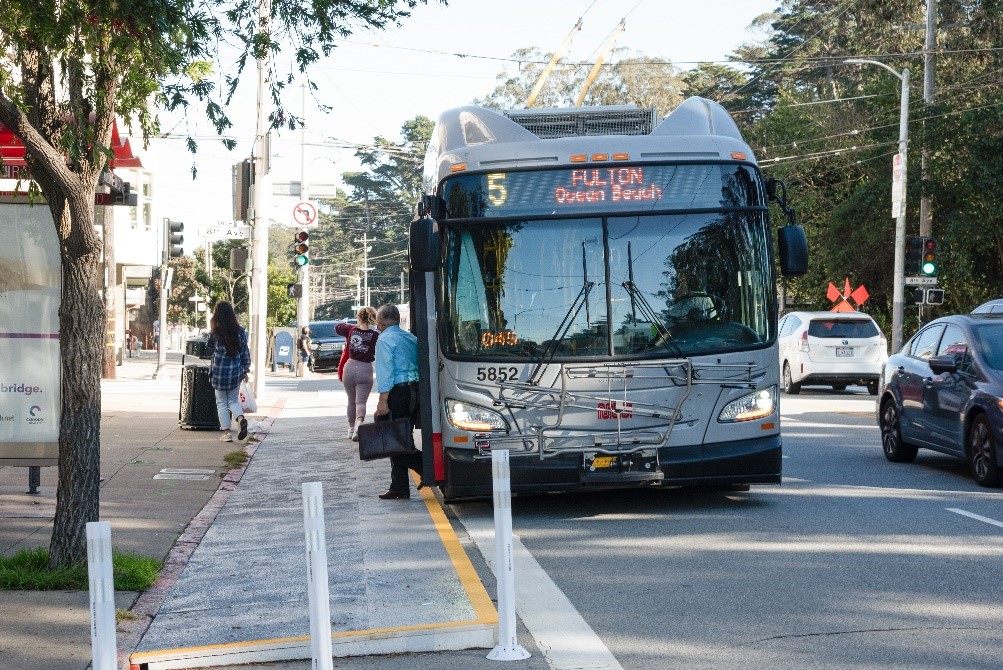 A temporary transit bulb was recently installed at 8th Avenue and Fulton, reducing travel time for the 5 Fulton and 5R Fulton Rapid and making boarding safer.
A temporary transit bulb was recently installed at 8th Avenue and Fulton, reducing travel time for the 5 Fulton and 5R Fulton Rapid and making boarding safer.
For those who ride the 5 Fulton or 5R Fulton Rapid in the Richmond District, you may have recently noticed something new about the bus stops on Fulton Street at 6th and 8th avenues. And perhaps you noticed that your bus ride seemed to go slightly faster or with less disruption.
Two new temporary transit bulbs installed at 6th Avenue eastbound and 8th Avenue westbound bring safety and transit benefits to Fulton Street in advance of the planned construction of permanent bulbs and are part of the Fulton Street Safety and Transit Project.
Six permanent transit bulbs between Arguello and 10th Avenue are ultimately planned, which will save time and improve reliability for riders on the 5 Fulton and 5R Fulton Rapid by reducing the time it takes for buses to pull in and out of traffic. The planned bulbs are all located at major entrances to Golden Gate Park, as well as on a stretch of Fulton Street that is part of San Francisco’s High Injury Network, the 13% of city streets that account for 75% of severe and fatal injuries. Both Muni riders and people who walk will benefit as the bulbs will expand the waiting area for riders, improve access for people with mobility needs and improve visibility for people walking.
With the installation of these temporary bulbs, we will have completed Muni Forward transit reliability upgrades along the entire route of the 5 Fulton and 5R Fulton Rapid – the first Muni lines to achieve this distinction. The bulbs add to over a decade of improvements to these lines, including:
- Installed bus bulbs, traffic signals that stay green longer for buses, and other Muni Forward reliability upgrades on McAllister and outer Fulton (2017-2018)
- Introduced 60’ buses on the 5 Fulton and 5R Fulton Rapid to reduce crowding that will be returning to service soon (2016-2017)
- Upgraded and expanded transit lanes on Market, Fremont and Beale streets (2014-2021)
- Launched the 5R Fulton Rapid, reducing travel times from the Outer Richmond by up to seven minutes (2013)
- Made McAllister a two-way street, saving three minutes per trip (2011)
- Extended evening service to Transbay Terminal (2009)
Additional safety improvements that have recently been completed on Fulton Street include daylighting (removing parking) at 34 intersections between Stanyan and La Playa streets and the installation of 13 painted safety zones. These enhancements improve visibility for drivers and make it safer for people walking. Soon we expect to install speed radar signs between 38th and 39th avenues and 40th and 41st avenues which will help reduce speeding and improve safety.
The project recently received additional funding with the help of Assemblymember Phil Ting, who secured $1.6 million from the state budget to be used on improvements along Fulton Street. Combined with a Caltrans Low Carbon Transit Operations Program allocation and Proposition K sales tax funds from the San Francisco County Transportation Authority, this funding will allow for improvements that will benefit tens of thousands of Muni riders and make Fulton Street a safer place for people walking.
Published December 03, 2021 at 11:43PM
https://ift.tt/3xOyLy1
Jumat, 03 Desember 2021
Show HN: Built a GitHub star ranking app for public repositories https://ift.tt/3xPnPQL
Show HN: A small utility to generate the web vitals you want https://ift.tt/31pIFua
Show HN: I built a data augmentation toolkit for computer vision developer https://ift.tt/3omogPs
Show HN: Transparent directory of remote software companies https://ift.tt/3Eot10a
Show HN: Irchiver, your full-resolution personal web archive https://ift.tt/3Ep5MmI
Show HN: A tool to build real websites built exclusively in SVG https://ift.tt/3ru9VSV
Show HN: Keypad Layout, keyboard-driven window manager for macOS https://ift.tt/32R0enb
Show HN: Open Sourcing the M3O Cloud Next Dashboard https://ift.tt/3dgwfas
Show HN: Go-promise – Golang's style to handle promises/error in JavaScript https://ift.tt/3dhtaH0
Show HN: Automatic proxy setup for SSH'able boxes that have no network access https://ift.tt/3DeZFAh
Show HN: I had some time yesterday so I made a GPT3 podcast to help you sleep https://ift.tt/3oiVpLA
Show HN: OOP Design Patterns with Python https://ift.tt/3dcG3SK
Show HN: Unikraft Cloud Platform: Unikernels-as-a-Service https://ift.tt/31oHECz
Show HN: VocalVoters: Send a Letter or Fax to Your Gov Reps in under 30 Seconds https://ift.tt/3rxlxEH
Show HN: AWS Compute Decision Tree – Helps you decide which AWS service to use https://ift.tt/3xRD3Vu
Show HN: Emoji to Scale https://ift.tt/3ptxFUK
Show HN: Chrome extension for adding footnotes to print-outs of web articles https://ift.tt/31fF169
Show HN: MathLingua – A Structured Language of Mathematics https://ift.tt/3DfB26l
Show HN: Cycle Labs – Testing software after it gets deployed to production https://ift.tt/3pjfMYB
Show HN: Data algebra, going back to Codd's relational operators https://ift.tt/3G5RJmE
Show HN: Node.js Online Editor and Persistent Execution https://ift.tt/32HSAeL
Show HN: Federalist, an un-censorable browser for the swarm https://ift.tt/3GeuZkB
Kamis, 02 Desember 2021
Show HN: Treemendous, accessible tree structure viewer and editor for the blind https://ift.tt/3ogGQbF
Show HN: Parallelized Fluid Simulation in C++ https://ift.tt/3G5mc4g
Show HN: I built an online programming language https://ift.tt/3piA3xu
Show HN: Earthly v0.6 https://ift.tt/3pi5ZC5
Show HN: I made a search engine that help you find services https://ift.tt/3rzoSDn
Show HN: KatLang – Language for Calculations https://ift.tt/3rtGJvb
Show HN: Evolve an AI to Play Snake with Neuro Evolution of Augmented Topologies https://ift.tt/3dbG8pS
Show HN: Cute-JSON – fast JSON formatter for Java https://ift.tt/31mQ9gY
Show HN: Hacker News with Popularity Gradient https://ift.tt/3G0gD6Y
Show HN: Max reHIT Workout – guides you through interval training workouts https://ift.tt/31htkM0
Show HN: A simple RDAP command-line client to check domain name availability https://ift.tt/3lm8L8b
Show HN: Box – Data Transformation Pipelines in Rust DataFusion https://ift.tt/3rpKFNs
Show HN: Galeras – Detect AI generated images vs. authentic photos https://ift.tt/3xGRjjI
Show HN: K8s Cross-Cluster Application Migration in 1 Minute or Less https://ift.tt/3d5qCM6
Show HN: Neko – Self hosted virtual browser that runs in Docker and uses WebRTC https://ift.tt/2ZLRY6W
Rabu, 01 Desember 2021
Show HN: Pictoclone, a Featureful Pictochat Clone https://ift.tt/3De4ppN
Show HN: AsyncGo: topic-based async discussions for teams https://ift.tt/3E8r345
Show HN: Generate responsive navigation with your tech stack of choice https://ift.tt/3d8WHTc
Show HN: Docx2LaTeX An AI-powered Word to LaTeX converter https://ift.tt/3rsJz3E
Show HN: I'm trying to bring Async to Django ORM https://ift.tt/3o8pgGK
Show HN: Wikiref – a Firefox web extension for extracting Wikipedia references https://ift.tt/3xCP8xy
Show HN: I made a free, ad-free and open source tool for sharing private notes https://ift.tt/3DewNb3
Show HN: Bar a simple archive tool in bash https://ift.tt/3ruebC1
A Green Light for Muni Customers
By Stephen Chun
Have you ever been on a Muni vehicle and realized that if the light had only stayed green for just a few more seconds you wouldn’t have been trapped at a red light? SFMTA’s Connected Corridor Pilot approached this problem with a new state of the art solution.
Most signals in San Francisco do not have sensors to detect vehicles at an intersection. However, through a grant from the U.S. Department of Transportation, our project team was able to test an advanced technology for signal timing based on who is present at an intersection. In this way, transit platform and traffic signal sensor data can be used to activate signal timing adjustments, responding to traffic conditions in real time. These adjustments provide more opportunities for transit vehicles to make it through intersections on a green light.
The project team turned on the adaptive signal timing program during several days in July and August 2021, with traffic engineers and traffic signal electricians monitoring intersections both in-person and by observing traffic cameras. Our priority was to reduce transit vehicle travel times. Once in place, we compared travel times for trains both before and after the new technology was implemented.
We found that with our pilot project, the average light rail vehicle (LRV) travel time along the 1-mile corridor was reduced by 66 seconds, resulting in an average travel speed increase of 21% from 8.2 miles per hour (MPH) to 9.9 MPH. With this system, the chance that a train will reach an intersection on a green light improved from 62.1% to 85.8%, meaning almost no red-light delay.
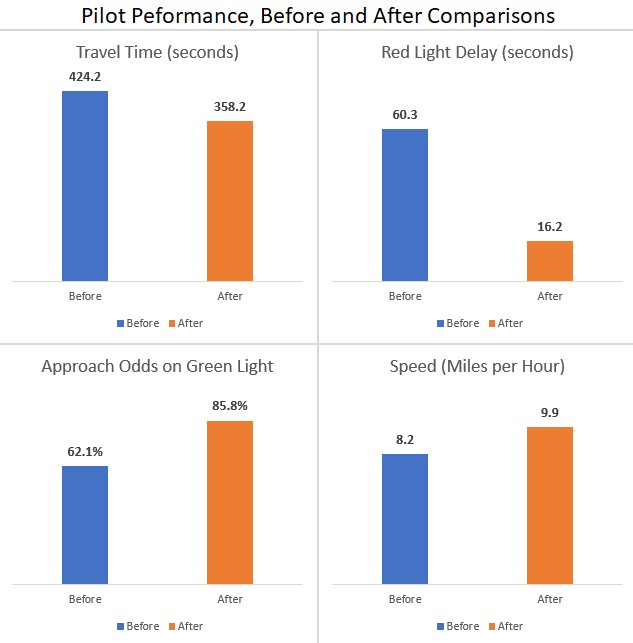
Figure 1. Pilot Corridor Performance, Before and After Comparisons
During the pilot, 60% of LRV corridor trips had 10 seconds or less of red-light delay, compared to only 5% previously. In fact, 20% of trains saw no red-light delay at all on the corridor, compared to the previous study period when not a single train avoided red light delay entirely.
Improving signal timing for just one specific mode or direction can potentially result in negative impacts for others. To evaluate this, we measured travel impacts to pedestrians and non-Muni vehicles to evaluate the potential effects from prioritizing transit. Fortunately, our data show that there was a 1% increase in the overall odds that other vehicles would encounter a green light and only a 1% increase in the odds that pedestrians would reach an intersection on a Do Not Walk symbol.
Vehicles on side streets were generally unaffected unless they were also held to prioritize train through traffic. Heavier volume side streets such as Mariposa Street had increased average wait times of up to 78% for vehicles, from an average wait of 46 seconds previously, to an average wait of 87 seconds during the pilot. Fortunately, the adaptive signal system only increased the average wait time by 4 seconds for pedestrians if they arrived on a Do Not Walk symbol, from 22 seconds to 26 seconds. Further refinement of the signal timing logic could help address these concerns.
With detailed information collected through the advanced sensors, our project team was able to make refinements and real-time signal timing adjustments that account for time of day, direction of travel, and the real-time volume of pedestrians, vehicles, and transit vehicles.
These promising results will lead the SFMTA to consider applying this technology in other locations to better understand how the system could work more widely around the city and any trade-offs that could arise in regard to overall traffic flows.
Looking forward, we are also exploring other new technologies. For example, the LiDAR (sensors that use lasers to identify objects) used in this project provides a new way to capture and classify objects at intersections, but there may be a need for additional sensors or different mounting locations to improve detection accuracy. Project staff will build upon the lessons learned from the pilot to inform future efforts to optimize the signal timing to make our streets better for all users.
Published December 01, 2021 at 04:01AM
https://ift.tt/31fWtr4